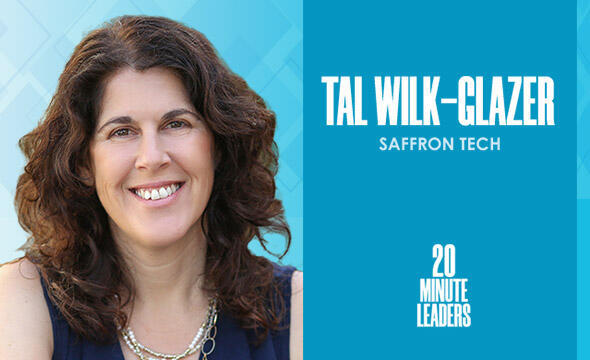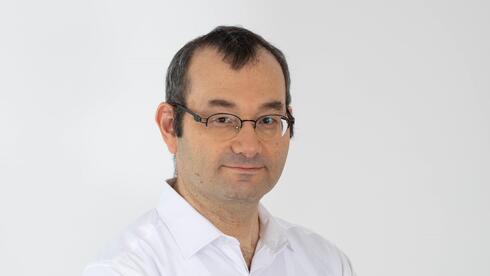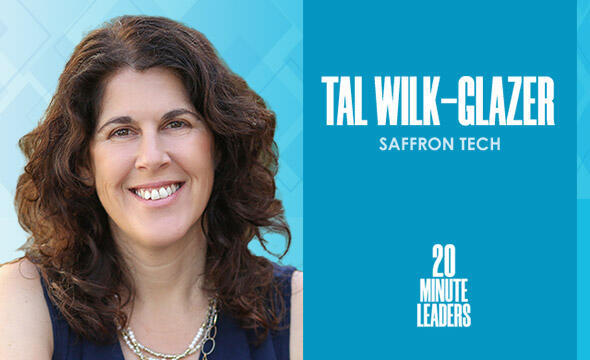
20-Minute Leaders
“I looked for opportunities to build things and make things different.”
After working in the fields of biology and then technology, Tal Wilk-Glazer says it’s fascinating to have them combine in her current role as CEO of Saffron-Tech.
After working in the fields of biology and then technology, Tal Wilk-Glazer says it’s fascinating to have them combine in her current role as CEO of Saffron-Tech. Though her previous jobs may not have had a common thread, she shares that each step of the journey gave her skills or knowledge that is relevant now. While she still loves the technology aspect of the company’s work to grow saffron more quickly and indoors, Wilk-Glazer says she has to keep a broader focus as CEO. The most interesting part of the job is helping others to do their best at their specific roles, she explains. Wilk-Glazer says her strengths are managing and executing, and she has to be extremely focused on management and planning when the company’s testing cycles are several months long. In any organization, she is looking for chances to build things and make them better.
How do you look back on your journey and identify the key points that you've had there?
When I'm looking at my journey, I love building things, whether it's a tree house or software. What I'm fascinated about is building things. Along the way, I looked for opportunities to build things and make things different. At the beginning, I was fascinated by biology, then by the IT industry and helping customers do things. I had the opportunity to combine both and to combine agriculture and biology with technology, and I really find it fascinating. And I just love moving between things and exploring different angles.
What have you really specialized in? Where is your domain expertise?
For years, I was saying that I don't have a profession. I learned human science, and then I went into the IT industry without much knowledge of computers and gathered it along the way. At the end of the day, what I know how to do is to manage things and to execute.
When I have a challenge, I am very good at breaking it into small components, defining priorities, and making the entire group, organization, myself, execute them. It's basically breaking it to small components, understanding priorities, what are the assets, what are the critical paths, and how to reach that point in the shortest possible way. This is what I love doing, and this is I think what I'm doing best.
What is it about this entrepreneurial mindset of getting stuff done that really gets you excited?
When I joined Saffron-Tech, it had been running already for a year and a half. The founder said that he would love me to lead the company. I told him, "Why do you need me? What is it I'm bringing with me?" It was amazing to realize that in each and every step of the journey, I had gathered skills and information and capabilities that I can use and I find very, very relevant.
This is the first time I really acted as the CEO of the company. The diversity of the position is amazing. The need to cover so many aspects. I just love to dive into the IT area and the machine learning and focus there, but this is not what I need to do. I need to release to the people who are experts there, and I need to be the facilitator and the enabler of others to do their jobs. I think this is the most fascinating part of being the CEO, the ability to enable others to be amazing in their jobs.
What is saffron? The word tech being associated with it throws me off. Tell me about that.
So Saffron-Tech’s mission is to take saffron—which is a traditional crop that’s a bulb flower blossoming once a year—and to trick nature and to be able to make the cycle much, much shorter and move it into an indoor, closely monitored, high-tech environment.
We need to use a lot of agriculture. Our agronome needs to understand the depth of the nature of this flower and understand exactly how we can maximize it. From the other angle, we need to build all the technology around it to grow it in the most efficient way and how to have the most optimal growth protocol using vertical farming and machine learning and AI. And to use robotics to enable the automated harvesting of the saffron, ensuring the quality of the saffron in a very efficient business model around it.
All of us are familiar with saffron as a spice. But saffron is much more than that. Saffron is an important compound in the health industry. There is very interesting research showing that saffron has great capabilities to improve the situation of people with depression or ADHD.
What I'm fascinated about these days is how to develop the market. If you look at the health industry, the food supplements, you will see that only very small and medium players are trying to use saffron. Because today there is almost no supply chain. Our ability to disrupt this market is amazing.
What is saffron and how did you specifically get into the world of saffron?
Saffron is a geophyte. It's basically a bulb. What we are using today as a spice is the flower stigmas. You see it a lot in the prestige cuisines. But you also see it in the health industry in a varied list of products, food supplements, and cosmetics containing saffron. The founder of the company loves consuming saffron as spice. When he realized the very high price he's paying today and the high demand for saffron, he felt that there is a real chance to disrupt the market and to take this geophyte and move it indoors.
When looking today at vertical farming, the majority of the companies are focusing on different kinds of green leaves. You don't see the more complex crops. In order really to take the bulbs, the corms, and to move them into vertical farming, you need to have very intimate knowledge and very clear understanding of how the bulb is pre-programmed to have a very complex life cycle.
The ability to have a real efficient business model and efficient growth of a geophyte is to trick nature and make him understand that fall is coming more often than once a year. When you know how to do it, we'll be able to go to many, many other geophytes used today, like onion or garlic. These questions need to be solved. Saffron allows us to easily solve them because of the very high market value of it.
What is the size of the market and the potential here?
Saffron is more or less a one billion dollar market. The amount of fake saffron in the market is very high. The data we have about saffron—because the majority of the crop is coming from Iran—is not very clear. We believe that when we will provide a stable supply chain of saffron, we will see a significant increase in the market size because we will have much bigger players using saffron in their products.
Did you always know that you wanted to get into food tech, agritech?
Not at all. I never thought that I would come back to biology. In the last 10 years, I was in the IT and cloud areas talking about digital transformation. I always liked biology, I always was fascinated by agriculture, but I really didn't see a way to combine them into my professional work.
When I had the chance to join, it felt like all the pieces were combining and building the right story. I find myself going to work very happy these days. It's really, really inspiring and challenging each and every day.
How is the project management or the day-to-day different between Saffron-Tech and your previous organizations?
Coming to Saffron-Tech, I realized that the speed of development is entirely different. In agritech, it's much, much more complex. The bulb has its own life cycle. When speaking about the test, the shortest test will take us a four- or five-months cycle in order to verify the proof.
When you have such long cycles, you need to manage and plan them very carefully. Each mistake is going to cost you in a delay of three or four or five months. The need to have very close planning and very close management is much more significant than in other software companies where I worked before. It takes everything I know about management and about planning and pushes them to the extreme.
Michael Matias, Forbes 30 Under 30, is the author of Age is Only an Int: Lessons I Learned as a Young Entrepreneur. He studies Artificial Intelligence at Stanford University, is a Venture Partner at J-Ventures and was an engineer at Hippo Insurance. Matias previously served as an officer in the 8200 unit. 20MinuteLeaders is a tech entrepreneurship interview series featuring one-on-one interviews with fascinating founders, innovators and thought leaders sharing their journeys and experiences.
Contributing editors: Michael Matias, Megan Ryan















